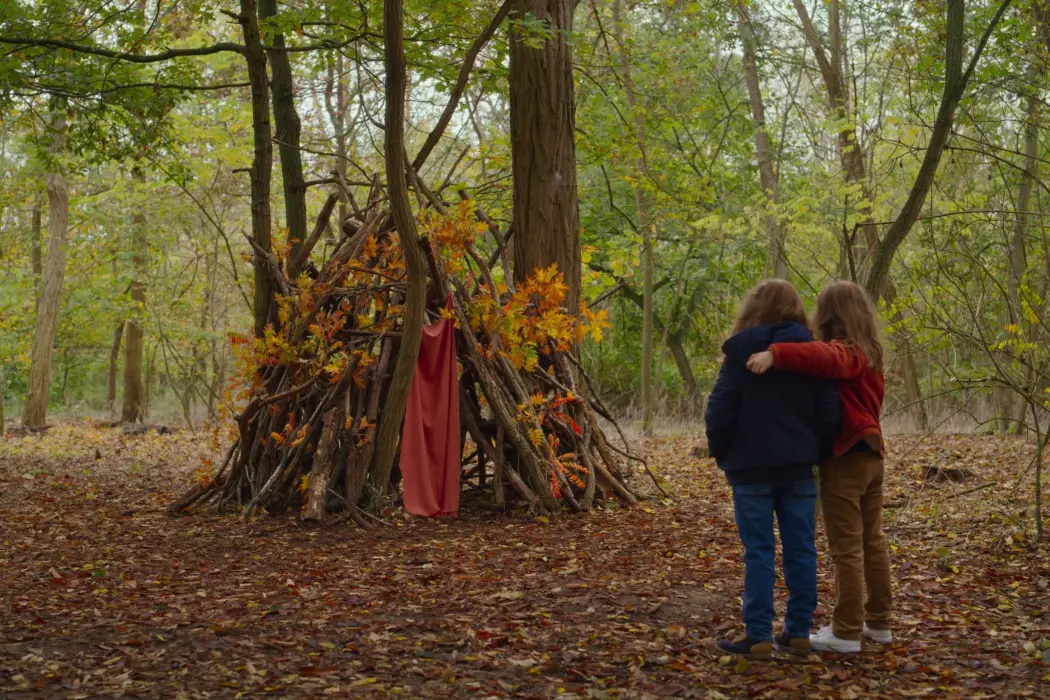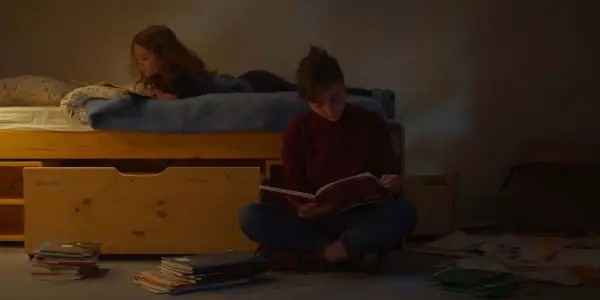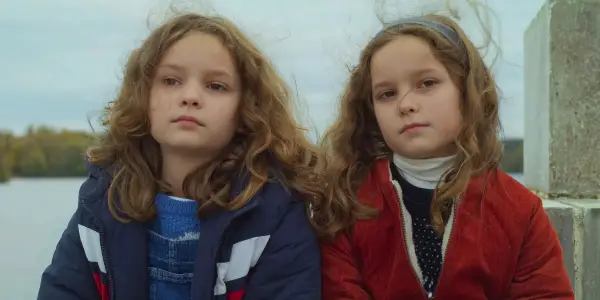TIFF 2021: PETITE MAMAN: Confronting Heavy Emotions with Fantasy and Love

Kevin L. Lee is an Asian-American critic, producer, screenwriter and…
Most filmmakers start with something small, and as their name becomes more and more well-known, the next film typically gets bigger. It’s fair to say that Portrait of a Lady on Fire was Céline Sciamma’s biggest film to date. It was only a matter of time before we hear about her next masterpiece. In the most unexpected and satisfying way, Petite Maman goes back to small, self-contained, coming-of-age storytelling.
Easily mistaken as a short film, Petite Maman breezes by with its 72-minute runtime. Eight-year-old Nelly (Joséphine Sanz) has just lost her grandmother. We see the room in the nursing home being emptied. We see Nelly’s parents (Nina Meurisse and Stéphane Varupenne) hold each other. They return to the mother’s childhood home as they clean out memories.
Elegant Characters, Guided by Beautiful Direction
During this time, we feel everything we need to feel already about these characters through their smallest behaviors. Nelly is crafty, considerate, and adventurous. Her relationship with her mother and father, however, is a different story. You can sense the distance between parent and child. You can feel it in the quiet silence between their lines of dialogue to each other. It’s not so much that Nelly is a neglected child, but more about both sides having an inability to truly communicate how they feel.

Either way, you will feel the words unsaid. The tension is palpable, the emotions bubbling underneath the surface. It’s what gave Portrait such dramatic power. That same magic permeates throughout Petite Maman, only with its heavy themes rendered purer and more innocent, all seen from a child’s point of view.
One day, in the middle of cleaning out their home, the mother leaves. As Nelly explores the woods, in search of the tree fort her mother built when she was young, she meets a girl who looks just like her. Her name is Marion, the same name as her mother’s. And that’s just the beginning of Nelly’s journey, which can only be described as a soft fantasy that feels both like the real world and like a child’s dream.
Production Design Meets Subtle Camerawork
Accompanying Sciamma’s wonderful screenplay is, once again, the amazing Claire Mathon as her cinematographer. Having worked with empty interior spaces and beautiful exteriors in Portrait, Mathon once again brings her subtlety and quietly impactful storytelling techniques.
Rooms are revealed to us through motion, through Nelly’s motion. We have the rare privilege of seeing the environment the same way she sees it. In other cases, the camerawork keeps us on our toes. A shot can look like an obvious POV shot, from Nelly’s point of view, until suddenly the camera pans and Nelly walks in frame.

Together, Sciamma and Mathon mold a small but very specific world for our characters to wander around in. Like the best single-location films, Petite Maman makes the most out of the childhood home. Minimally furnished and naturally lit, the location carries both childlike wonder and ghostly phenomena.
Petite Maman: A Remarkable Bridge Between Parent and Child
Even though the film is, strictly speaking, a coming-of-age story from the child’s perspective, it is also very much a mother’s story. Yes, Nelly is the protagonist, but it is Marion who holds the frame when the title Petite Maman appears on the screen.
It’s a clever and remarkable bridge between parent and child, to find that love, fear, and affection that binds us together. Because Marion used to be an eight-year-old child just like Nelly currently is. Because at some point in time, past or present, we would understand and hear each other and be one and the same. Petite Maman accomplishes this without ever having to fully commit to hard fantasy world-building, with the burden of its own rules or exposition. Rather, the fantastical is simply there to elevate the people’s fears, anxieties, and desires.
Sciamma has made another gem of a film. Not only is she one of the best directors working today, but she is also, quite simply, an incredible storyteller who loves her characters. Though the film addresses true heavy topics like grief, doubt, and regret, it explores them with an overwhelming sense of comfort. You can watch and hold Petite Maman close to your heart, knowing that the characters are going to be okay, that they will survive whatever it is they are afraid of confronting.
Did you see Petite Maman? What did you think of the film? Share below!
Petite Maman was released in theaters in France on June 2, 2021.
Watch Petite Maman
Does content like this matter to you?
Become a Member and support film journalism. Unlock access to all of Film Inquiry`s great articles. Join a community of like-minded readers who are passionate about cinema - get access to our private members Network, give back to independent filmmakers, and more.
Kevin L. Lee is an Asian-American critic, producer, screenwriter and director based in New York City. A champion of the creative process, Kevin has consulted, written, and produced several short films from development to principal photography to festival premiere. He has over 10 years of marketing and writing experience in film criticism and journalism, ranging from blockbusters to foreign indie films, and has developed a reputation of being “an omnivore of cinema.” He recently finished his MFA in film producing at Columbia University and is currently working in film and TV development for production companies.













